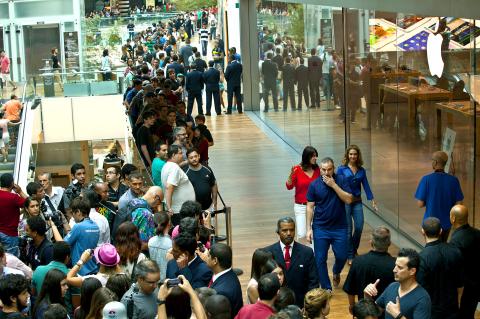About 1,700 impatient shoppers lined up for hours on Saturday for the grand opening of Apple Inc’s store in Rio de Janeiro — the first official outpost in South America.
First in line was Thiago Cuba, 31, who said he was looking forward to shopping at the glistening new computer store in a tony section of Rio — even though he was experiencing sticker shock.
The price of Apple prices in Brazil “continue to be very high,” but gradually are coming down, Cuba told the O Globo newspaper.

Photo: Bloomberg
“There are some [Apple products] here that are close to what they would cost in [US] dollars,” said Cuba, as he prepared to shell out hard-earned reales for a new printer, headphones and some cellphone cases.
“I expect that the prices will fall,” he said, adding that “the quality of the products is worth it.”
Part of the reason the products are so expensive in Brazil is the country’s high import taxes. An iPad Air that costs US$499 in the US, goes for more than US$700 in Brazil.
Apple officials said they were delighted finally to tap the enormous pent-up demand of customers in this huge country with its burgeoning population of middle-class consumers.
Robust economic growth over the past decade has allowed more than 40 million people to exit poverty and join the ranks of the middle class.
“We are very excited about the first of what we hope will be many stores in Brazil,” said Steve Cano, Apple’s senior vice president, speaking to the Valor business newspaper.
Brazil — South America’s most populous country — is the world’s seventh largest economy and Latin America’s biggest. There are just 26 million smartphones in a population of about 200 million people, making the market ripe for growth.

Taiwan’s technology protection rules prohibits Taiwan Semiconductor Manufacturing Co (TSMC, 台積電) from producing 2-nanometer chips abroad, so the company must keep its most cutting-edge technology at home, Minister of Economic Affairs J.W. Kuo (郭智輝) said yesterday. Kuo made the remarks in response to concerns that TSMC might be forced to produce advanced 2-nanometer chips at its fabs in Arizona ahead of schedule after former US president Donald Trump was re-elected as the next US president on Tuesday. “Since Taiwan has related regulations to protect its own technologies, TSMC cannot produce 2-nanometer chips overseas currently,” Kuo said at a meeting of the legislature’s

TECH WAR CONTINUES: The suspension of TSMC AI chips and GPUs would be a heavy blow to China’s chip designers and would affect its competitive edge Taiwan Semiconductor Manufacturing Co (TSMC, 台積電), the world’s biggest contract chipmaker, is reportedly to halt supply of artificial intelligence (AI) chips and graphics processing units (GPUs) made on 7-nanometer or more advanced process technologies from next week in order to comply with US Department of Commerce rules. TSMC has sent e-mails to its Chinese AI customers, informing them about the suspension starting on Monday, Chinese online news outlet Ijiwei.com (愛集微) reported yesterday. The US Department of Commerce has not formally unveiled further semiconductor measures against China yet. “TSMC does not comment on market rumors. TSMC is a law-abiding company and we are

Semiconductor shares in China surged yesterday after Reuters reported the US had ordered chipmaking giant Taiwan Semiconductor Manufacturing Co (TSMC, 台積電) to halt shipments of advanced chips to Chinese customers, which investors believe could accelerate Beijing’s self-reliance efforts. TSMC yesterday started to suspend shipments of certain sophisticated chips to some Chinese clients after receiving a letter from the US Department of Commerce imposing export restrictions on those products, Reuters reported on Sunday, citing an unnamed source. The US imposed export restrictions on TSMC’s 7-nanometer or more advanced designs, Reuters reported. Investors figured that would encourage authorities to support China’s industry and bought shares

FLEXIBLE: Taiwan can develop its own ground station equipment, and has highly competitive manufacturers and suppliers with diversified production, the MOEA said The Ministry of Economic Affairs (MOEA) yesterday disputed reports that suppliers to US-based Space Exploration Technologies Corp (SpaceX) had been asked to move production out of Taiwan. Reuters had reported on Tuesday last week that Elon Musk-owned SpaceX had asked their manufacturers to produce outside of Taiwan given geopolitical risks and that at least one Taiwanese supplier had been pushed to relocate production to Vietnam. SpaceX’s requests place a renewed focus on the contentious relationship Musk has had with Taiwan, especially after he said last year that Taiwan is an “integral part” of China, sparking sharp criticism from Taiwanese authorities. The ministry said